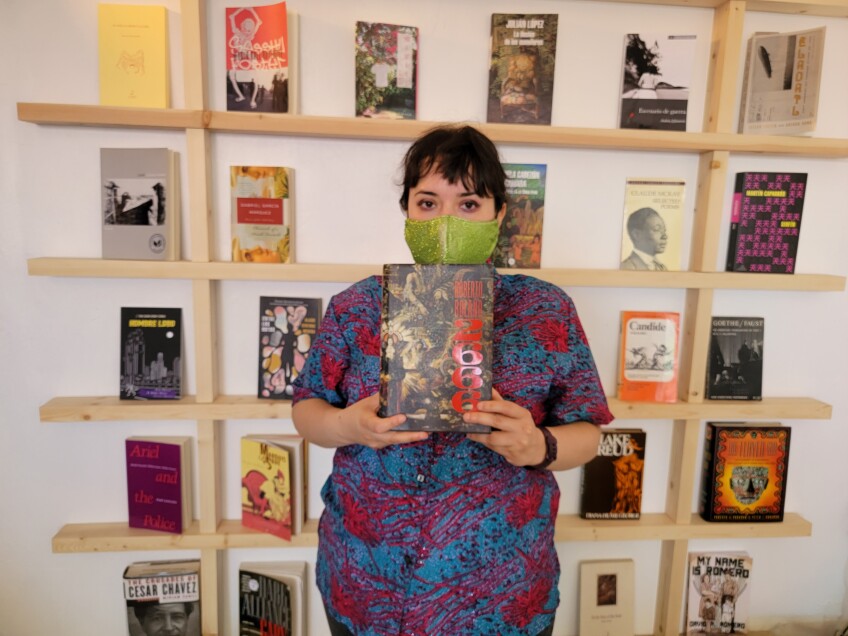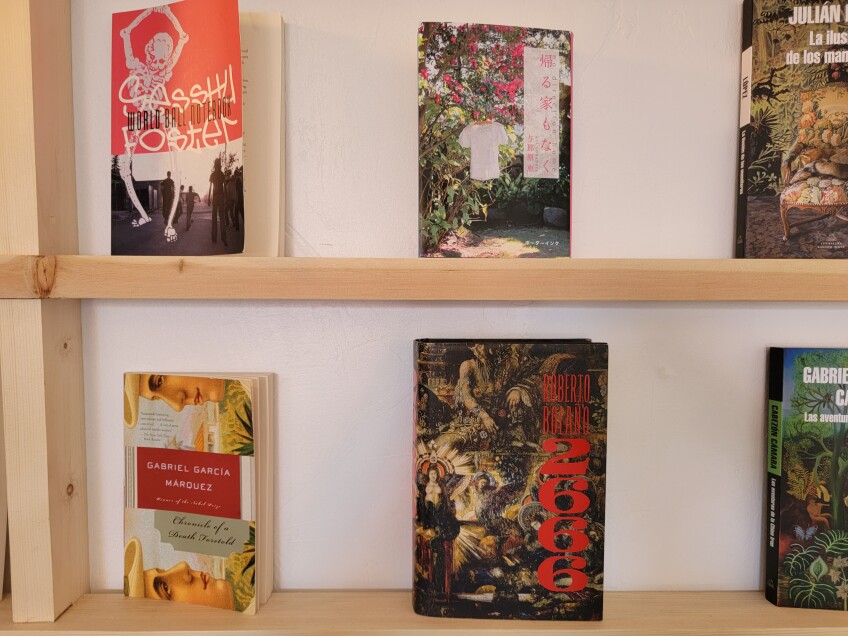How This Bookstore Centers the Latinx Community in Boyle Heights

This story is part of a series of stories and education resources featuring East L.A. and its surrounding neighborhoods and communities.
Editor’s note: Re/Arte Centro Literario is currently open for online shopping only due to the pandemic, but owner Viva Padilla anticipates to reopening by mid-February.
Despite opening in the middle of a pandemic in June 2021, Viva Padilla found an outpouring of community support for Re/Arte Centro Literario, a bookstore in Boyle Heights, where she uses an unexpected dash of math to source, organize and showcase her favorite books.
Padilla has been an active contributor to Los Angeles’ literary community for about 10 years by hosting events such as poetry open mics. She has also co-produced Dryland, a literary journal that focuses on writers of color, with local writer Nikolai Garcia for six years. This work inspired Padilla to open a space to hold events and serve as headquarters for this creative work.
Children’s books are the first ones to disappear in my free pile, they just fly off the shelf outside.Viva Padilla
“It wasn’t that complicated. This place kind of fell into my lap. I knew the person that was in here before, and they were leaving, so they were like, ‘If you want this space, you should try to get it,’” said Padilla.
Writers such as Roberto Lovato and legendary East L.A. poet Marisela Norte both stopped by to give Padilla their blessing. Re/Arte has already hosted at least four book release parties, including a reading for local poet Briana Muñoz’s poetry collection, “Everything is Returned to the Soil.”
Re/Arte focuses on books from Latinx authors and authors from Latin America, such as Graciela Limón and local writers. Writers from small presses as far as Mexico City visit and drop off their books. When deciding which books to source, Padilla uses data collection, the kind we learn as kids by doing simple surveys, to take note of the books people in the community are interested in reading. Padilla also carries the occasional book in the literary canon, such as “The Catcher in the Rye” for students looking to complete their required reading assignments.
“I’ve had people come in from the community, ordinary folks asking me for more Spanish language books, so now I’m putting in an order to get Spanish language books, and the children’s books are the first ones to disappear in my free pile, they just fly off the shelf outside,” Padilla said.
After being open for about seven months, Re/Arte is already serving as more than a bookstore for the community. Re/Arte hosts talks on various topics such as the urban planning of Tenochtitlan with professor Elias Serna, open mic nights on the second and fourth Saturday every month, and weekly writing workshops with Poet Matt Sedillo. However, all programming is currently paused or virtual due to the Omicron variant surge.

“I think, particularly for Black or Chicano neighborhoods, we have to be everything; we just can’t be a bookstore. We can’t just sell books. We have to engage with the community, we have to offer cultural events, and to me it's pretty much a labor of love,” said Padilla.
Some of the books at Re/Arte are hard to find, such as a Spanish translation of Edgar Allan Poe’s “The Raven” which was printed in the ‘70s and was still in its original packaging, which Padilla sold to someone from Jalisco who had always wanted to read “The Raven.” To get these rare books in more hands, Re/Arte has a program where patrons can buy a used book and then bring the book back when they’ve read it in exchange for another book.
“I looked at the books that I had and said, ‘Some of these are pretty amazing and hard to find, some of these I want to read, and I want other people to read, so I don’t want there to be a scarcity of books, I want there to be these great books always available.’ I want five people to be able to read ‘2666’ by Roberto Bolaño. I want people to bring it back two weeks later and pick up another book,” Padilla said.

When organizing the books that get placed on the middle wall, a focal point for the store, Padilla uses spatial sense to determine the best location and position for each book. She chooses books by sorting the ones on her personal reading list, though she jokes she is sometimes disappointed when patrons buy the book before she has a chance to read them. “In Search of Bernabé” by Graciela Limón has already passed through the shop twice, and is another one of Padilla’s favorite books. Padilla carefully sorts and curates the rest of Re/Arte books into stacks for curious readers to peruse.
Padilla’s use of data collection, organizing, sorting and spatial awareness shows a range of the fundamental math skills we learn as children and carry with us into our adult lives — into practical, real-world applications.
Padilla said she would have loved a space like Re/Arte in her community as a teenager growing up in South Central Los Angeles.
I think, particularly for Black or Chicano neighborhoods, we have to be everything; we just can’t be a bookstore. We can’t just sell books. We have to engage with the community, we have to offer cultural events, and to me it's pretty much a labor of love,Viva Padilla
“I would go to the library but that was the extent of my interaction with the bigger world. I didn’t have professors or teachers to guide me, I didn’t have local community members who could help me. I always wanted to find art, I always wanted to find ideas,” Padilla said.
Re/Arte is in a small space, but Padilla has big plans for the future. She would like to grow Re/Arte into a community center with bigger art shows and workshops and build a darkroom to hold photography workshops.
“We’re still brand new, I don’t know where it’s going to go, but I hope it goes that way, that we have more of the younger kids coming in,” said Padilla.




